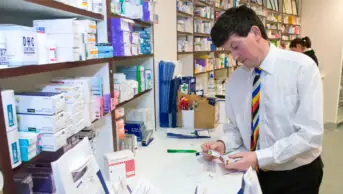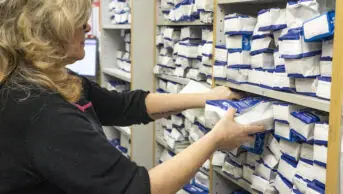
Shutterstock.com
On 11 November 2020, the UK became the first country in Europe to pass the grim milestone of 50,000 COVID-19 deaths, a figure that had risen to more than 60,000 a month later. Sadly, pharmacy staff, who have been on the frontline of fighting the pandemic since the first cases were reported in the UK in January 2020, form part of this huge death toll.
Of the seven deaths we know about, six are from a black, Asian and minority ethnic (BAME) background, which seems to fit with the national picture that people of black and South Asian ethnic backgrounds have an increased risk of dying from COVID-19 compared with those of a white ethnic background.
All of these deaths happened towards the beginning of the outbreak, when social distancing had only been in place for a few weeks, there was no widespread testing and face coverings were not compulsory in shops. Personal protective equipment (PPE) was difficult to come by for pharmacy staff during those early months and advice on when to use it was ever changing. Risk assessments for staff from BAME backgrounds were brought in at the end of April 2020.
Despite early concerns over social distancing and access to PPE, community pharmacies have remained open to support their patients throughout two national lockdowns, while GP pharmacists have adapted to telephone and video consultations, and hospital pharmacy staff have been redeployed to deal with hundreds of thousands of the sickest patients. It is this dedication to their patients that friends and family talk about when they remember their loved ones.
Navin Shantilal Talati
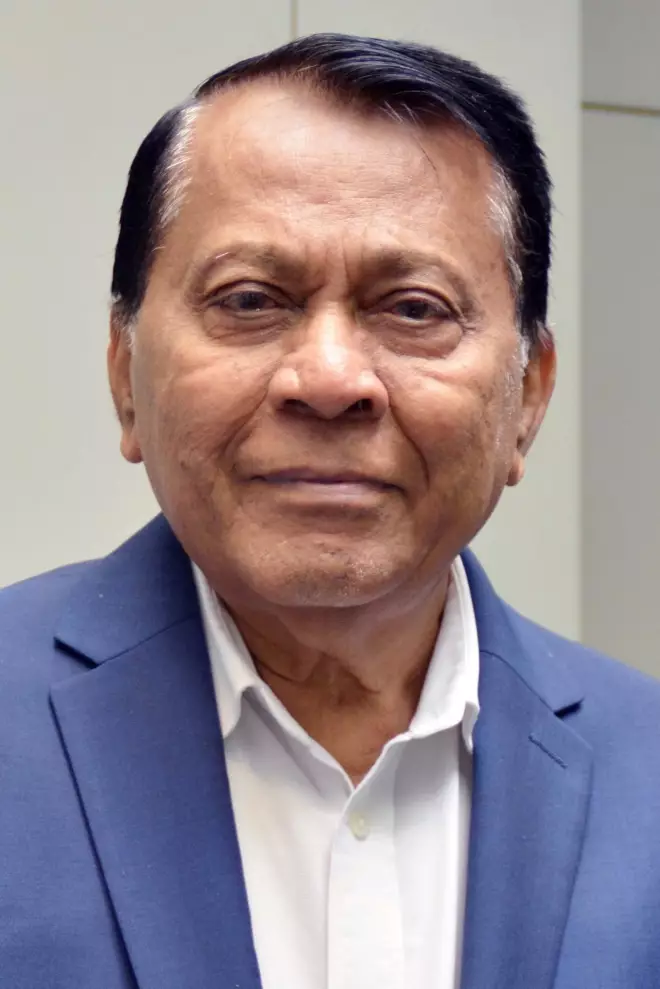
Navin Shantilal Talati
His son Minesh Talati, who describes his father as his best friend as well as his mentor, says the whole family is devastated by his death, which has left a big hole in their lives.
He would deliver medicines to housebound patients and open his pharmacy at midnight to dispense emergency medicines
“He was definitely the head of the family and this has left a void in all our lives,” says Talati. “He was so full of life; he would work eight till eight.”
Navin first arrived in the UK from Ahmedabad, India, with £3 to his name, doing a conversion course in pharmacy at the University of Sunderland before moving to work at the Whittington Hospital in London.
In 1977, he opened his own pharmacy, Talati Chemist, which became the first pharmacy in Essex to open seven days a week and offer home delivery.
“He was so generous,” says Talati, describing how his father would deliver medicines to housebound patients and open his pharmacy at midnight to dispense emergency medicines, instilling that kindness and work ethic into his two children.
Ever the innovator, in the 1980s Navin redesigned blister packs to make it simpler for nursing homes to administer medicines, therefore reducing errors. Before his death, he had just received his certificate of 46 years of continuous service from the Royal Pharmaceutical Society.
Navin was still working in the healthcare company he co-founded in 2006, overseeing more than 300 staff, says Talati, who is an implant surgeon.
The family is in the process of bringing legal action against health secretary Matt Hancock and PHE because of the lack of advice they had given about the level of community transmission back in February 2020.
Talati had visited his father at his home in north-east London in the first week of March 2020, unaware that he had contracted the virus, most likely in late February 2020. His wife and 74-year-old mother also contracted the virus around the same time.
“Our argument is the government should have been transparent regarding the extent of community transmission in February and offered the social distancing evidence much earlier than in mid-March.
“Knowing my dad, he would not have stopped, but I wouldn’t have visited him with the grandkids or without wearing a mask. The public weren’t given the opportunity to decide. We want them to take ownership of their choices.”
Talati took his father into hospital early on, before he was even ill, because he had spotted that his oxygen levels were dropping.
“On the balance of probability, he would have been saved now, because of the lessons we have learned from the first wave, from steroid use to proning early,” he says.
Mandy Siddorn
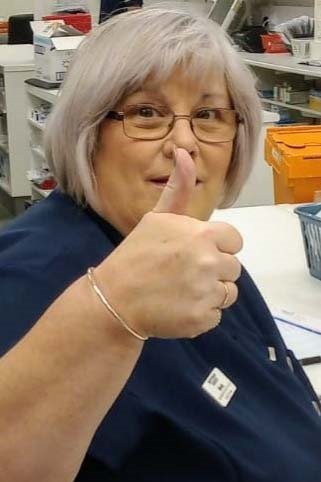
Mandy Siddorn
Registered checking technician Mandy Siddorn, 61, had only worked at Swettenham Chemists in Chester for a year before she died from COVID-19 on 8 April 2020, but she had made a big impression on her colleagues.
Four members of staff attended her funeral service and other colleagues held a minutes’ silence, wore pale blue ribbons and released helium balloons outside the pharmacy.
In a touching tribute posted on the pharmacy’s social media page, her colleagues said: “Mandy is being remembered as a loyal, hardworking, dedicated and joyous friend to all of us.”
Her daughter, Aimee Cheyne, says her mum had worked in pharmacy for 19 years and loved her job.
“She would speak to me every night on the way home to say how busy she had been, but also how much fun she had had.
“Her colleagues were like a family to her, even after such a short time.
My mum was never one to take any time off work and, I think, a reason for this is because she loved what she did, and who she worked with and for
“My mum was never one to take any time off work and, I think, a reason for this is because she loved what she did, and who she worked with and for,” she adds.
Cheyne describes her mum as “one of a kind” and says she was the most amazing nana to her young daughter Molly, who misses her and speaks about her every day.
“She always liked to give advice, no matter if you asked for it or not, and was there for you no matter what time of the day, even just for a hug or a shoulder to cry on. She is missed immensely.
“I feel, with all that is happening, you can’t grieve properly, because you can’t hug the people you really need.”
Lockdown had only been in place for three days before Mandy died, says Cheyne, remembering it as a very confusing time.
“Social distancing and mask-wearing instructions were unclear and testing didn’t even exist.”
Cheyne was made redundant in June 2020 and the family claimed under a government life assurance scheme that offers families of frontline staff who die from COVID-19 a £60,000 payment, which finally came through in November 2020.
“It will never bring my mum back but will certainly help and offer some security. Our case actually went up to Parliament to decide, which is what caused the delay. Apparently they are struggling with pharmacy workers, especially if in the community, due to them not being direct NHS staff,” she explains.
Jayesh Patel

Jayesh Patel
Locum pharmacist Jayesh Patel, 53, who died in hospital on 22 April 2020, after calling in sick to work just before lockdown, was a loving and understanding family man who was adored by his two daughters, aged 16 years and 19 years.
He was a very genuine and caring person and he would feel for everyone
“He was a very genuine and caring person and he would feel for everyone,” says Kanan Patel, his wife of 22 years.
Even though he caught COVID-19 early in the pandemic, he had been taking extra precautions and was taking it very seriously, she explains.
At the time he got ill, he started with flu-like symptoms, but there was no testing, she explains. It was about ten days before he finally went into hospital.
He never wanted to make a fuss, she explains, and probably did not go to hospital as soon as he should have done. The last time she saw him was when he left in the ambulance.
“He left in such a rush and I never thought he would never come back.”
“He must have been very, very scared when he was in the hospital and I think about that a lot. I wasn’t allowed to see him and I really, really feel angry about that,” she adds.
Jayesh worked regularly in several different pharmacies in Hampton, Guildford and Aldershot, and he would have some patients who would only come in for their medicines on the days he was working.
People who knew him have had some really kind words to say about what he meant to them, she says.
While the family believes they are eligible for the death-in-service benefit and want to claim to provide for his daughters’ futures, they have been unable to do so yet, because of a lengthy probate process.
“I do want to pursue it for the girls, but when I looked at the form there is some information we don’t have right now.”
Smita Patel, the owner of Guildford Chemist, where Jayesh had done weekly shifts for the past five years, says he was a kind man with a dry sense of humour.
“My staff were very, very upset when they found out about Jay. They adored him and they still all talk about him in a really fond way,” she says.
“When you have a locum who works for you just one day a week or to cover holidays, it’s really important that the staff trust them, and they had every faith in him. Everybody liked working with him.”
He was thorough and methodical in his work, and just the other day they found his handwriting when going through some paperwork, she says.
“There are these little reminders. It hit us all hard because he was so young and there was nothing wrong with him.”
Birender Rawat
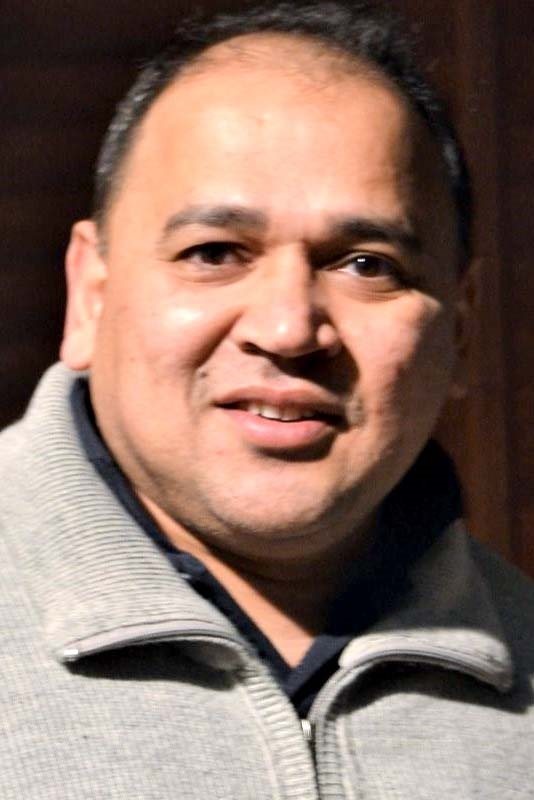
Birender Rawat
Community pharmacist Birender Rawat, 48, died in hospital on 1 April 2020, after being taken by ambulance to North Middlesex Hospital just three days earlier, when he collapsed at home.
His close friend, Sudeesh Chandrasekharan, says his death was a great shock and they are all still struggling to process what has happened.
He was such a jovial person and so much fun, he would joke with all his customers
“He was such a jovial person and so much fun,” he says. “He would joke with all his customers. He was very popular and such an extrovert.”
A huge football fan, Birender worked for the Pharmocare Pharmacy, directly opposite Tottenham Hotspur Stadium. He had loved taking photographs and sharing them on social media when the new stadium was under construction.
His wife, who is a teacher, and two children, could not get any information about him from the moment he went into hospital, and they still have questions about what happened to him, after initially being given conflicting information about when he died.
“We don’t even know what treatments he had or anything. The hospital was so stretched at the time,” says Chandrasekharan.
“And now [the family] are trying to sort out the death-in-service benefit. It’s been six months and they still haven’t received the probate letter, so they can’t apply for it. The family are just waiting,” says Chandrasekharan, who first became friends with Birender when they were at university in 1997.
Originally from India, Birender moved to the UK, did his overseas accreditation, then preregistration training, before qualifying and working at Pharmocare, where he had been for 16 years.
His death was a wake-up call for his pharmacist friends, who realised they had to take careful precautions to protect themselves, says Chandrasekharan, who lived close to his friend in Enfield and sees the family regularly.
“Even now when I see people not abiding by the rules, I think it is because they don’t appreciate how serious it is because it has not happened to someone they know.
“My wife and I still say we can’t believe it.”
Chandrasekharan arranged a fundraising page for Birender, because they had so many people from all over the world who had known him and wanted to support the family or pay their respects, but who could not travel to the funeral owing to the pandemic.
It raised almost £6,000, which his wife pledged to a charity for local children Birender had been involved with.
“There were lots of people who were keen to do something. He was loved by everyone.”
Box: More pharmacy staff who have died of COVID-19
Pooja Sharma
Pooja Sharma, 33, a pharmacist at Eastbourne District General Hospital, died on 26 March 2020. Just hours earlier, her father had also died after contracting COVID-19.
Pooja’s colleagues opened a book of condolence in the chaplaincy at Eastbourne District General Hospital. In a press release, chief pharmacist Simon Badcott said the team had been devastated to hear of her death. “Pooja was a much loved and respected part of our pharmacy family. It was a privilege to call her a colleague. She will be missed terribly, especially her enthusiasm and sense of humour.”
Mehool Patel
Mehool Patel, 48, owned and worked at Bliss Chemist in Kilburn, north London, along with his two brothers. He died on 23 April 2020, after contracting COVID-19.
Family friend Shital Patel said in press reports at the time that Mehool will be “greatly missed professionally as well as by his family. His passing is such a great loss for the profession; he was so passionate about his patients and the profession. He always made an effort to get to know patients on an individual level — he would have done anything for them.”
Jermaine Wright
Jermaine Wright was a senior pharmacy technician in the aseptic unit at Hammersmith Hospital. He died in hospital on 27 April 2020, at the age of 45 years. He had worked for the pharmacy team at Hammersmith since 2015, with previous roles at the Royal Brompton and Great Ormond Street Hospital.
Outside work, Jermaine was heavily involved in amateur football at Hackney Marshes. In a press release, his colleagues said he was well known to staff for his expertise, precision, kindness and pride in his work, and would be “hugely missed”.
Chief pharmacist Ann Mounsey added: “He was enormously proud of his work and through his expertise in making and quality-checking products — such as chemotherapy for our oncology and haematology patients as well as parenteral nutrition for our premature babies — he helped save countless lives.”
If you know of other members of the pharmacy profession who have died of COVID-19, please do get in touch with us via dawn.connelly@rpharms.com
